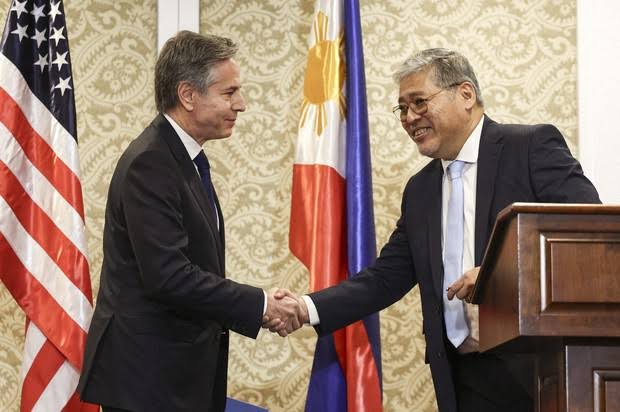USA stresses 3-way ties with Philippines, Japan, ahead of summit

U.S. Secretary of State Antony Blinken stressed the importance of the partnership between the United States, the Philippines and Japan in terms of enhancing stability in the Indo-Pacific region, as he spoke to reporters following talks with Philippine Foreign Secretary Enrique Manalo in Manila on Tuesday.
Blinken’s remark came as Washington said U.S. President Joe Biden will host Philippine President Ferdinand Marcos Jr. and Japanese Prime Minister Fumio Kishida for a trilateral summit next month, as the countries step up cooperation against the backdrop of China’s continuing aggressive actions in the South and East China seas.
“The trilateral with Japan is a very important platform for building even greater stability and deepening peace,” said Blinken who arrived in the Philippines on Monday after visiting South Korea.
Manalo echoed Blinken’s view and added, “Our leaders intend to capitalize on the complementarities between existing Philippine-U.S. and Philippine-Japan bilateral cooperation, notably in infrastructure, critical minerals, energy and maritime security.”
Blinken said the United States shares the Philippines’ concern about China’s “actions that threaten our common vision for a free, open Indo-Pacific,” citing Beijing’s use of water cannons and blocking maneuvers against Philippine vessels in Manila’s exclusive economic zone in the South China Sea.
“These waterways are critical to the Philippines, to its security, to its economy, but they are also critical to the interests of the region, the United States, and the world,” he added.
Blinken reaffirmed the U.S.-Philippine mutual defense treaty applies to armed attacks on the Philippine Armed Forces and public vessels including those of the Southeast Asia country’s coast guard in the South China Sea.
Beijing asserts its claim over almost the entire South China Sea, even though the Permanent Court of Arbitration in The Hague in a 2016 ruling invalidated the claim to the resource-rich sea.



